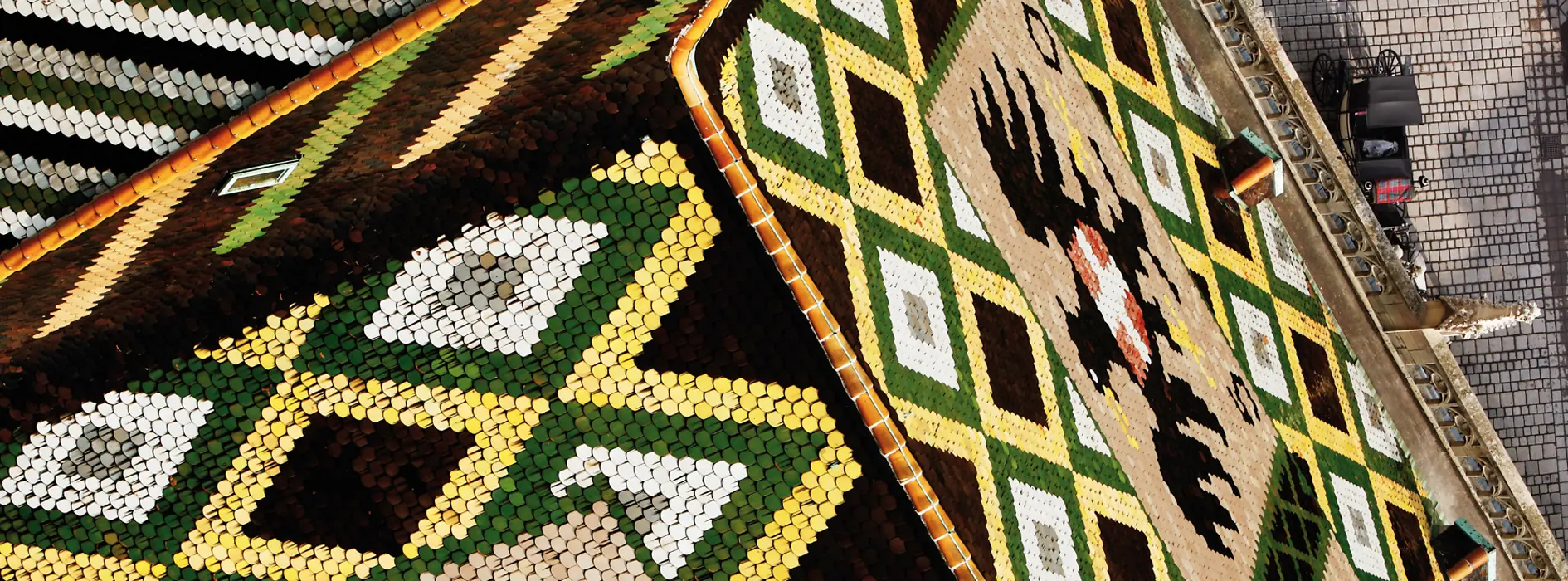New era of tourism: Vienna presents the Visitor Economy Strategy 2025
- Contribution of tourism to Vienna’s GDP to increase from EUR 4bn to EUR 6bn
- Net revenue from overnight stays reported by accommodation providers to advance from EUR 900m to EUR 1.5bn
- Visitor satisfaction levels to remain at their current high level, with nine out of ten guests recommending Vienna
- Attitudes to tourism to stay overwhelmingly positive, with nine out of ten residents seeing tourism in a positive light
- Number of tourism providers certified with the Austrian ecolabel „Österreichisches Umweltzeichen“ to double from 112 to 224
- Proportion of arrivals by train (21%) and car (26%) to be reversed
Video "Visitor Economy Strategy - Shaping Vienna (Teaser)"
Tourism has established itself as a core economic sector in just a few decades. In Vienna, it is behind direct and indirect economic impact of EUR 4bn each year, 90,000 jobs, outstanding infrastructure and an arts and cultural scene that is unparalleled on the international stage. The number of arrivals reported by Vienna’s accommodation providers has risen by more than 150% since 1990, to 7.5 million in 2018. “Vienna is an increasingly in-demand travel destination and we are committed to further growth – but not at any price. Vienna’s new Visitor Economy Strategy is a seamless continuation of the city’s previous strategies and represents a fresh new way of thinking and means of sustainable development that, rather than undermining the foundations of success, is aligned to the city’s goals and the needs of the people who live here. The central question for the years to come is not ‘what can our city do for tourism?’; instead the focus will be on what tourism can do for our city!” said Mayor of Vienna Michael Ludwig, explaining the approach behind the 2025 Vienna Visitor Economy Strategy.
Visitor economy: blueprint for sustainable tourism growth
The underlying principle of the visitor economy goes far beyond the standard definition of tourism: it opens up perspectives on the diversity of our guests and the countless ‘temporary Viennese’ who make the city the center of their lives for the duration of their stay. The term ‘visitors’ applies to all guests who live, work or study here, go shopping or stroll the streets, make use of its cultural and leisure facilities, or come to the city on business or to attend meetings. They bring economic benefits, an outside perspective on the capital, and a wealth of influences, ideas and skills with them, making an active contribution to quality of life, quality of place and quality of experience in the city – to the advantage of residents, other visitors and businesses in Vienna.
Collaborative approach the key to success
“Nine out of ten Viennese see tourism in a positive light. This allows us to strike out in new directions from a position of strength and consensus. Growth, affluence and prosperity are by no means a given, we have to work hard to achieve them – while maintaining a clear awareness of the upcoming challenges and ensuring that all of the participants in the visitor economy ecosystem are moving together in the same direction,” explained Peter Hanke, Executive City Councillor of Finance, Business, Digital Innovation and International Affairs, and President of the Vienna Tourist Board.
“It is not only the visitor economy mindset but also the consideration of residents' attitudes to tourism and numerous stakeholders dialogs in the strategic process that makes this a wholly new management approach without precedent, also internationally,” Hanke added. In addition to involving stakeholders from the tourism sector and meetings industry, drawing up the strategy involved a broad cross-section of representatives of the visitor economy ecosystem including municipal district leaders, urban and property developers, retailers, mobility providers and universities. An international advisory board also provided insights into the broader picture. “Vienna’s Visitor Economy Strategy 2025 was drawn up over a period of 12 months in a stakeholder process led by the Vienna Tourist Board. In a total of 21 strategic workshops, we developed a full and coherent picture of how we want Vienna to develop as a destination over the years to come. I would like to express my sincere gratitude to everyone who was involved,” said Hanke.
Farewell to purely overnight statistics
“The guiding principle of our strategy is simple: the visitor economy needs to add value. For the companies in the ecosystem, this is a question of ‘business added value’; for the city and its residents, it means ‘city added value’,” explained CEO of Vienna Tourist Board Norbert Kettner. From a marketing perspective, the task is still to reach out to an audience that is interested in Vienna’s premium offering and which integrates well into the city. In contrast to earlier strategies, there is no longer a target number of bednights, even though Vienna’s success is predicated on stable growth in demand. The Vienna Tourist Board wants to take specific steps towards achieving its goals in partnership with the City of Vienna and all of the partners in the visitor economy ecosystem in three areas (Place Making & Place Marketing, Meeting Destination Vienna and Smart Solutions).
Six KPIs to measure success
Strategic targets call for measurability and benchmarks – developing a system of indicators measuring balance, is a prerequisite for taking informed decisions and for making progress visible. Vienna is already setting new international standards in the holistic analysis of data to support the development of the destination. Progress towards achieving the goals set out in the Visitor Economy Strategy 2025 can be measured using six key performance indicators, which cover revenue and economic impact, resident and visitor satisfaction, and environmental developments.
1. Direct and indirect economic impact induced by tourism in Vienna will increase by 50% from EUR 4 billion in 2018 to EUR 6 billion by 2025.
Data source: Tourism Satellite Account (TSA) – Statistics Austria/Austrian Institute of Economic Research Vienna (Wifo)
2. Net revenue from overnight stays generated by the Vienna hotel industry – a core sector of the visitor economy – will increase by two thirds from almost EUR 900 million in 2018 to EUR 1.5 billion by 2025.
Data source: Municipal Department 23/Municipal Department 6/Vienna Tourist Board own calculations
3. The quality of experience for guests will remain high: at present, nine out of ten visitors would recommend Vienna as a travel destination. The aim is to sustain this high level. Data source: Tourism Monitor Austria (T-MONA) visitor survey (leisure guests)
4. At the same time, nine out of ten local residents believe that tourism is good for Vienna. This overwhelmingly positive attitude to tourism from the population is a key benchmark, and one which needs to be maintained despite increased visitor numbers.
Data source: annual representative survey of around 3,600 residents of Vienna by the Vienna Tourist Board, conducted by market researcher institute Manova
5. The number of businesses in the capital’s tourism and leisure sector certified according to the Austrian ecolabel “Österreichisches Umweltzeichen” will double from 112 in 2018 to 224.
Data source: Austrian Federal Ministry for Sustainability and Tourism
6. Traveling to Vienna (especially from neighboring markets) using eco-friendly modes of transport: by 2025 the goal is to reverse the proportions of visitors who arrive by car (currently 26%) and by rail (21%).
Data source: Tourismus Monitor Austria (T-MONA) visitor survey (leisure guests)
New role for the Vienna Tourist Board: networker, curator and, occasionally, spoilsport
“The role of tourist boards has changed a great deal globally”, explained Kettner. “We are no longer a pure-play destination marketing agency: we fulfil a curatorial and networking role to ensure the ongoing high-quality development of the destination and add fresh impetus alongside all of the players in the city. Destination management is one of our core competences in addition to specific targeting of prospective visitors in marketing the destination. This also means that we have to play the role of ‘spoilsport’ in situations where vested interests stand in opposition to the common good. Vienna is famous for promoting innovation and entrepreneurship. Where developments are a significant hurdle to economic, environmental or social sustainability, rules and intervention are also needed. In such cases, the Vienna Tourist Board will have a hands-on role in shaping the necessary frameworks, as our city is a precious commodity that must be handled with the utmost care,” Kettner emphasized.
Region Concept for non-central parts of the city
Raising the visibility of new and interesting locations within the destination will create additional attractions and help to ensure that the positive effects of the visitor economy are better distributed in the city. “More than 50% of visitors to Vienna have already been to the city and a quarter come every year, which represents an opportunity to raise awareness of new experiential spaces outside the core tourist zone and ensure that economic impact is distributed more evenly across the city’s neighborhoods. The Vienna Tourist Board will draw up a marketing concept for central and non-central parts of the city that will receive creative impulses and be shaped by public and private initiatives to increase footfall in the places where people and businesses want to feel the additional benefits,” said Kettner.
Future projects with potential to become hotspots: event venue, bus terminal, banks of the Danube
Particular importance will be attached to new urban hotspots such as the proposed event venue and bus terminal projects, and the banks of the Danube and the Danube Canal. Efforts by hoteliers to cast their accommodations as meeting hotspots for locals and tourists alike must likewise be taken into consideration. As a location for filming, Vienna can also present lesser-known sides to the city, helping to attract more international productions to the city from film and TV to streaming platforms.
Meetings as a driver for location development
Vienna’s meetings industry is a flagship sector of the visitor economy. Today it already accounts for one in eight overnight stays recorded in the city. And at around EUR 540 per day, congress participants spend almost twice as much in the destination as the average visitor to the capital. Meetings will be increasingly used in future to drive the international visibility, competitiveness and development of the city as a business location. In close alignment with the upcoming Vienna 2030 – Business and Innovation location strategy, analysis of existing potential in the meetings segment should reveal additional development opportunities.
New Meeting Destination Vienna brand
“From now on, we want to use the newly accentuated Meeting Destination Vienna brand to position Vienna even more clearly as a destination for congresses and corporate events on the global market,” Kettner explained. Austria Center Vienna and Messe Wien site play a prominent role reflecting Vienna’s commitment to continuous quality upgrades. Services to assist international event organizers and associations in various areas, including compliance with regulations or liaising with local business and research expertise are intended to help Vienna build on its pioneering role in the global meetings industry.
No cooperation with mass tourism
“Mass tourism organizes itself. Every guest who visits Vienna is precious to us – but Vienna will still not promote or market offerings that bring unchecked mass tourism or could compromise the sustainable development of Vienna’s visitor economy,” said Kettner. “Our marketing activities will increasingly address the core target audiences that match the Visitor Economy Strategy’s premium focus – such as the meetings industry, luxury travel and LGBT guests. Art and culture will continue to be a central focus of our marketing activities. Long-standing formats will be subject to even greater scrutiny than before,” Kettner commented, confirming by way of example that the city would no longer be appearing at the ITB tourism show in Berlin.
Defending the quality of public spaces
Public spaces need to be quality areas where people can spend time, move freely and interact with one another. “The common interest has to take precedence over private transportation, misappropriation of public spaces through excessive street trading or bargain-basement offerings in any form,” Kettner said, citing opinions from the latest survey on attitudes towards tourism among the Viennese population: 58% of Vienna residents indicated they were in favor of measures to regulate runaway street trading, while 54% wanted checks put in place for souvenir stands. “The amendment of the ‘Gebrauchsabgabengesetz’ law on fees for usage and the new rules put in place for ticket sellers dressed as Mozart in the center of the city was a decision that is fully in line with the philosophy behind the Visitor Economy Strategy. I would like to express my sincere gratitude to everyone in the city involved in this foresighted move,” Kettner noted.
Positioning Vienna as a Night Jet hub
Vienna’s visitor economy is also a question of the careful use of natural resources and the adoption of smart solutions that will preserve quality of life for the present and future generations. Working alongside the railway companies under the banner of Rail Service Development, the aim is to increase the number of people who travel to the city by train and position Vienna as a Night Jet hub: by 2025 the goal is to reverse the proportions of visitors who arrive by car (currently 26%) and by rail (21%).
Focus on long-haul connections and network carriers
Under the Air Service Development agreement, the Vienna Tourist Board and Vienna International Airport have been working together since 2016 on pioneering projects to bring new direct flights to the capital from cities all over the world. Smart Air Service Development is about realigning long-term collaborations with a primary focus on long-haul services and cooperation with legacy carriers which boost Vienna’s standing as an air traffic hub with their strong networks.
Smart transport solutions
Technology-driven management of coach and shuttle bus services will help avoid overburdening the road network at peak times. With the support of operators, more environmentally friendly means of transport will be promoted for short transfers involving groups such as cruise ship passengers. Quality controls and training measures for taxi and private hire drivers and the introduction of special tickets for the public transportation network for congress, exhibition and meetings participants are among the other action areas for the mobility sector.
Carbon-neutral air travel for the Vienna Tourist Board
As a step towards taking even more environmental responsibility the Global Destination Sustainability Index (www.gds-index.com) will be used as a benchmark. It is also used by other European cities, amongst them Barcelona, Vienna’s long-standing partner in the field of meetings industry. Certification of Viennese operators with the Austrian ecolabel “Österreichisches Umweltzeichen”, classification of accommodation providers according to sustainability criteria and green meetings are among the other core action areas. The Vienna Tourist Board is also sending out a signal: in future, CO2 emissions attributable to business trips taken by air will be offset through Climate Austria.
Setting international standards
Another of the visitor economy’s focuses is to integrate the principle of the sharing economy, with a focus on fairness and a level playing field. “As rental platforms emerged, Vienna was quick to respond, putting the necessary legal frameworks in place, such as the amendment to the Vienna Tourism Promotion Act, making it a pioneer on the international stage. Given our approach, I am also pleased with the proposed nationwide registration requirements for AirBnb and the like,” Kettner said. He would also like to step up the integration of international standards in various areas including digital payment methods. “We are currently working to integrate Chinese payment services WeChat and Ali-Pay at our tourist information offices,” Kettner explained.
Premium. Cosmopolitan. Digital
All of the measures outlined in the Visitor Economy Strategy 2025 are based on its core values, which themselves represent an extension of the “Global. Smart. Premium” focus set out under the 2020 tourism strategy.
PREMIUM: Vienna is committed to delivering premium quality. Not just as a hallmark, but also as a reflection of our mission to continue investing in and actively advocating for it. Premium quality is one of the keys to sustainable development: the city attracts people who value quality and high standards. As a rule, this results in a respectful approach to the city, strong satisfaction rates and a willingness to integrate into life in the city.
COSMOPOLITAN: As a global capital, Vienna is all about open-mindedness, diversity and tolerance. It is a cosmopolitan city that is synonymous with an international make-up, and sees diversity and the different linguistic and cultural backgrounds of its residents as a strength. This makes Vienna attractive for visitors, who, in turn, contribute to the diversity of the city.
DIGITAL: Vienna will become a digitalization capital. Digital data allow us to build up a picture of how people use the capital and to see where the obstacles are – a key prerequisite for expanding the visitor economy to all parts of the city, defusing stress situations and combining offerings. Digitalization has to continue to function as a cultural tool in line with the tenets of digital humanism: in the background and user friendly, and never as end in itself.
We are all part of the visitor economy!
The Vienna Tourist Board initiated and coordinated the process behind the development of the 2025 Visitor Economy Strategy, and will play a central role in its implementation. Like the other stakeholders in Vienna’s visitor economy ecosystem, it will be involved, by turns, in a leading, consulting and supporting role. “The sheer diversity of the core action areas clearly shows that success will only be possible through cooperation and dialog between all of the players in Vienna as a destination, beyond the City of Vienna and the Vienna Tourist Board. Over the years to come, the Vienna Tourist Board will continue to actively offer platforms to support the process of information sharing, reflection and development so that we will meet our ambitious targets,” Kettner announced.
Visitor Economy Strategy 2025 online
The full Visitor Economy Strategy 2025 – Shaping Vienna document, additional information, explanatory graphics and videos can be found online at shaping.vienna.info. Over the coming years this microsite will provide a platform for reporting on progress and the wider process. You can find the status report on the forerunner, the Tourism Strategy 2020 online at www.tourismstrategy2020.vienna.info
#ShapingVienna
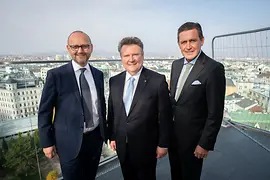
Bild in Druckqualität herunterladen
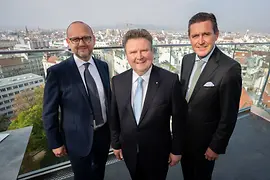
Bild in Druckqualität herunterladen
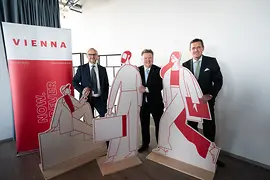
Bild in Druckqualität herunterladen
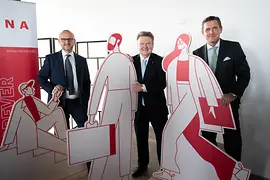
Bild in Druckqualität herunterladen
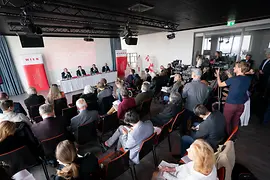
Bild in Druckqualität herunterladen
Textalternative anzeigen
ENVisitor-Economy-Strategy-2025
